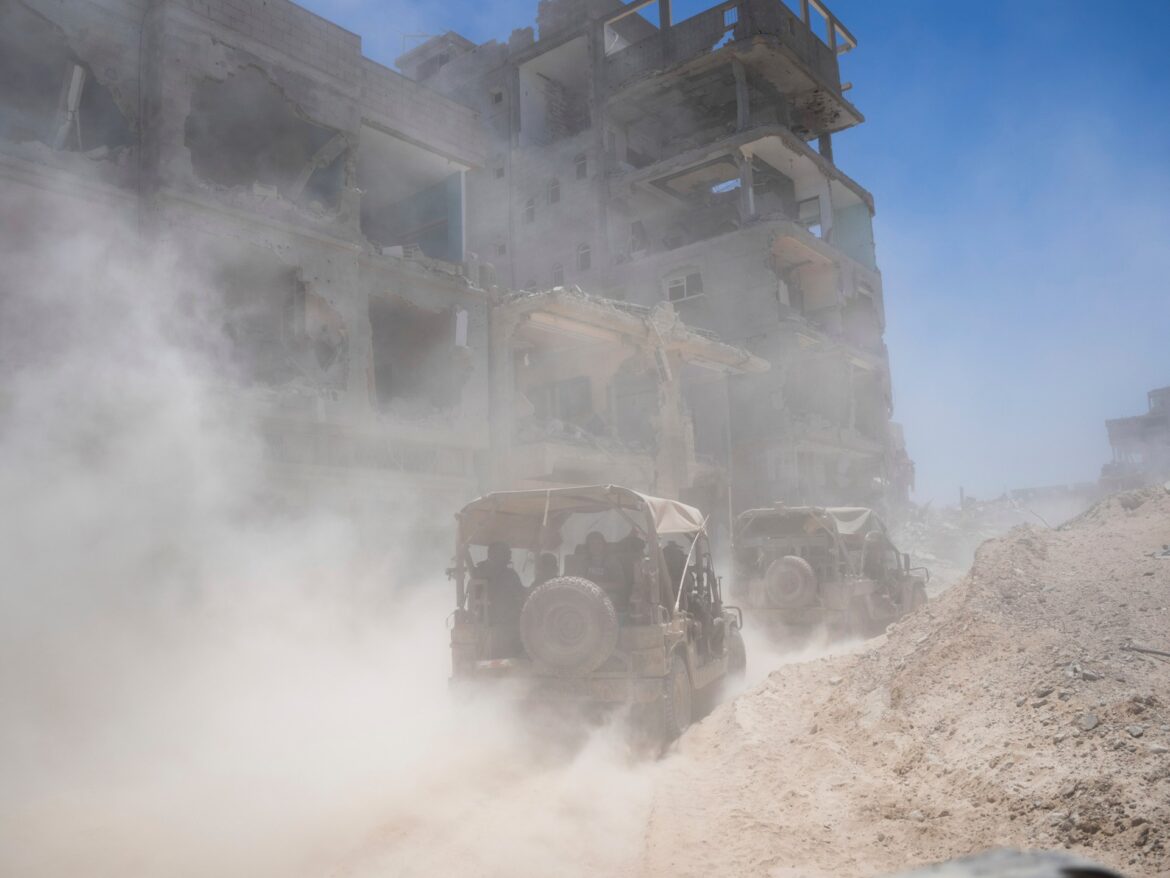Israel invaded Rafah on May 6, promising a “limited” operation against Hamas fighters, but two months later the southernmost city has become a dust-covered ghost town.
The Associated Press photojournalist was one of the first foreign journalists allowed into the Palestinian city, home to most of the two million people displaced in Gaza by Israel’s devastating war. Israel bars international journalists from entering the Gaza Strip independently.
More than 150 Palestinian journalists working in the field have been killed in Israeli attacks, making it one of the deadliest conflicts for journalists.
Abandoned, bullet-riddled apartment buildings have blown out walls and shattered windows. Bedrooms and kitchens are visible from roads strewn with piles of rubble that overlook passing Israeli military vehicles. Very few civilians remain.
Israel, accused of disproportionate use of force in Gaza, says it wants to completely defeat Hamas. More than 70% of the enclave’s homes have been destroyed by the Israeli air and ground offensive since October 7, 2023.
In the last week of May, the International Court of Justice (ICJ) ordered Israel to “immediately” cease its military attack on Rafah, which is facing a humanitarian crisis due to the blockage of humanitarian aid. In January, the UN Supreme Court ordered Israel to prevent any act of genocide.
Nearly 40,000 people were killed, half of them children and women.
Rafah, an area of about 65 square kilometers (25 square miles) on the border with Egypt, was considered a safe zone where most Palestinians fleeing Israeli bombardment have taken refuge. But Israel invaded the southern city despite international concerns, claiming that Hamas fighters had settled in the area. The Jewish state has provided no evidence for its claims. Since the war began nine months ago, Israel has repeatedly targeted areas designated as safe zones.
An estimated 1.4 million Palestinians have crowded into Rafah after fleeing Israeli bombardment elsewhere in the Gaza Strip. The UN estimates that about 50,000 of them remain in Rafah, which had a pre-war population of about 275,000. Last week, the UN said most of Gaza’s 2.4 million residents were now displaced.
Most people are huddled in squalid tent camps along the beach, with limited access to clean water, food, toilets and medical care.
Efforts to deliver humanitarian aid to southern Gaza have stalled since Israel closed Rafah, one of two main crossings into southern Gaza. According to the UN, little humanitarian aid can enter through the other main crossing, Karem Abu Salem (Kerem Shalom), because Israeli settlers have attacked aid trucks.
On Wednesday, a line of trucks on the Gaza side of Karem Abu Salem was visible, but the trucks were barely moving – a sign that Israel’s pledge to keep the road safe to facilitate the delivery of aid into Gaza has fallen flat.
U.N. officials say some commercial trucks have braved the road to Rafah, but not without hiring armed guards on the roofs of their convoys.
Israel claims to be on the verge of dismantling the group as an organized military force in Rafah. To show that confidence, soldiers took journalists in open military vehicles on the road leading into the heart of the city.
Along the way, debris lying at the side of the road highlighted the dangers of delivering aid: truck wrecks baking in the hot sun, dashboards covered with wire mesh meant to protect drivers, and empty pallets of aid.
According to aid groups, the longer humanitarian aid is frozen, the more likely Gaza is to run out of fuel, which is essential for hospitals, water desalination plants and vehicles. Most hospitals have been paralyzed by repeated Israeli attacks.
“Hospitals are running out of fuel again, threatening to disrupt essential services,” said Dr Hanan Balkhy, World Health Organization Regional Director for the Eastern Mediterranean. “People are dying because ambulance services are experiencing delays due to fuel shortages.”
As the humanitarian situation worsens, Israel continues its offensive. Israeli Prime Minister Benjamin Netanyahu has reiterated that any potential ceasefire agreement should allow Israel to resume operations in Gaza. The Hamas group wants an end to the war to be included in any deal.
After reporters heard gunshots nearby on Wednesday, soldiers told the group they would not visit the beach as planned.
The group left the city shortly after, with clouds of dust kicked up by the vehicles temporarily obscuring the mass of destruction behind them.



